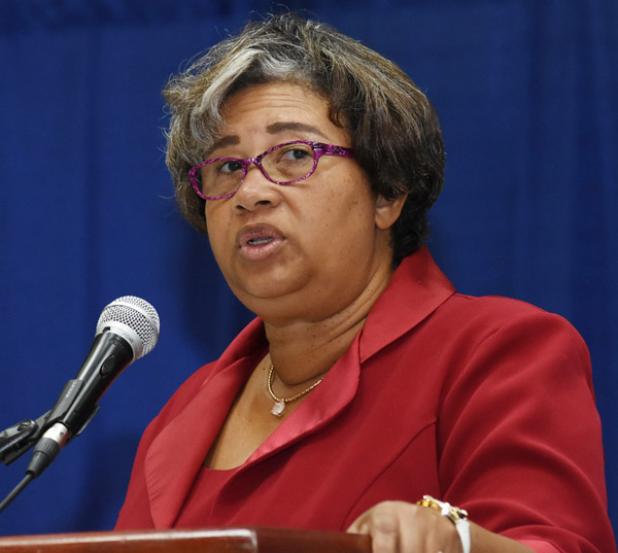
Chief Medical Officer, Dr. Joy St. John.
Measles outbreak in Europe being monitored
LOCAL health officials are keeping an eye on the measles outbreak in Europe.
This assurance came from Chief Medical Officer (CMO), Dr. Joy St. John, who told The Barbados Advocate that at present, while the situation is being monitored, she is not overly concerned about this development because of the Ministry of Health’s ongoing immunisation programme.
Dr. St. John explained that not only has the country recorded a coverage rate in the ’90s as it relates to the level of immunisation, she also revealed that in Barbados, two doses of the vaccine are administered. “With that high coverage, it is most unlikely that there would be an issue of outbreak. The ones who are not immunised are the ones who would be at risk.
“As we do two, it is unlikely that someone who is not immunised would cause problems for the ones who are immunised. So we are just monitoring the situation,” she said.
According to the World Health Organisation (WHO), the disease remains one of the leading causes of death among young children globally, despite the availability of a safe and effective vaccine. Approximately 134 200 people died from measles in 2015 – mostly children under the age of five.
At present the viral disease is wreaking havoc in parts of Europe, mainly concentrated in areas where immunisation coverage is low.
According to Dr. St. John, “For the people who don’t want their people immunised, we have a process of counselling and [they] are also recorded both at the Ministry and I was informed by the Immunisation Manager at the Ministry of Education, of course within the individual schools they would know. So if there is any issue of illness, we would be informed and we would go from there.”
For those children who have not yet been vaccinated, the CMO is encouraging parents to monitor their child’s health and at the first sign of illness they should seek medical assistance.
She also issued a caution about encephalitis, an infection of the brain; and meningitis, which can also be caused by the measles virus.
“We don’t want anything going wrong. So if they do see signs of illness, especially if it’s for a long time and the child is not doing well, they should seek medical attention.”
She revealed that the Ministry of Health was in a heightened state of readiness, even before the outbreak in Europe, as it prepares to join countries around the world in recognising Vaccination Week of the Americas which is celebrated during the last week of April. This public health campaign is intended to promote equity and access to immunisation.
According to the World Health Organisation, “Measles is a highly contagious virus that can cause potentially serious illness. As measles remains endemic in most parts of the world, it can spread to any country, including those that have eliminated the disease. Every un- or under-immunised person regardless of age is therefore at risk of contracting the disease; this is especially true in those countries where persistently low immunisation rates increase the risk of a large outbreak with possible tragic consequences. National authorities should maximise their efforts to achieve and/or sustain at least 95 per cent coverage with two doses of measles-containing vaccine to prevent circulation in the event of an importation.”
The first sign of measles is usually a high fever, which begins about ten to 12 days after exposure to the virus, and lasts four to seven days. A runny nose, a cough, red and watery eyes, and small white spots inside the cheeks can develop in the initial stage. After several days, a rash erupts, usually on the face and upper neck.
Over about three days, the rash spreads, eventually reaching the hands and feet. The rash lasts for five to six days, and then fades. On average, the rash occurs 14 days after exposure to the virus (within a range of seven to 18 days). (JH)
